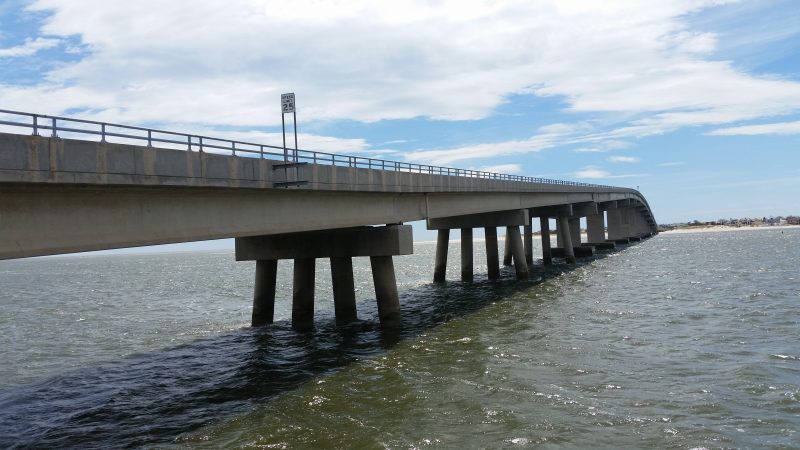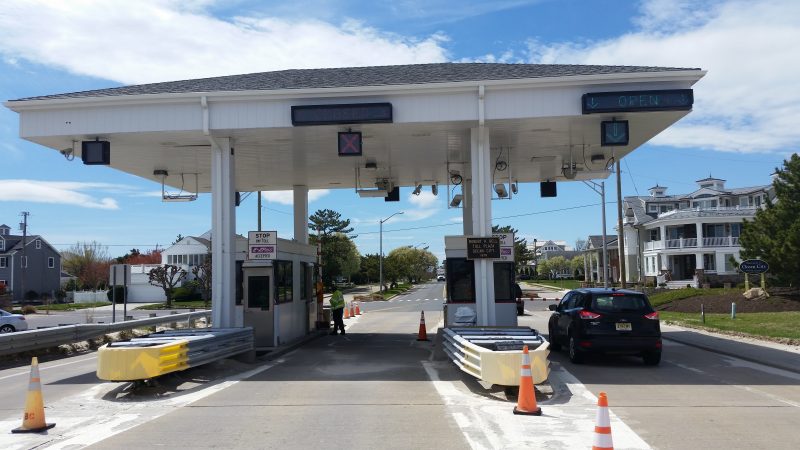By DONALD WITTKOWSKI
Don’t be surprised if a toll collector holds out a basket the next time you pay in cash on the five bridges linking the Cape May County beach towns along the coast-hugging Ocean Drive.
Hoping to limit their exposure to coronavirus, toll takers with the Cape May County Bridge Commission are wearing protective gloves and asking motorists to drop their cash and coins in a basket when they pay their $1.50 fare.
Officials with the bridge commission stressed that the coronavirus pandemic is a strong reason why motorists should stop paying in cash and should instead use the E-ZPass automated toll system.
“If they don’t want to use money, get E-ZPass,” Maryanne Murphy, one of the bridge commission’s three board members, said during a meeting Thursday that included a discussion of the coronavirus outbreak.
The commission had discouraged members of the public from attending its monthly meeting, but set up a teleconference for people to participate remotely – part of the “social distancing” measures that are now common in the pandemic.
Karen Coughlin, the bridge commission’s executive director, explained that baskets, gloves, hand sanitizers and disinfectants are ways toll collectors are protecting themselves now from the virus.
“We are providing everything we can to our collectors in the booth,” Coughlin said.
Scott Halliday, another board member, described the process of using baskets to allow motorists to pay their tolls as “like a collection in church.” Once the money is collected in a basket, it is sprayed with disinfectant.
The bridge commission’s network includes the Ocean City-Longport Bridge, Townsends Inlet Bridge, Corsons Inlet Bridge, Middle Thorofare Bridge and Grassy Sound Bridge along the scenic Ocean Drive coastal route.
Coughlin said nearly 80 percent of the bridge traffic uses E-ZPass, which allows drivers to pay their tolls electronically.
But about 20 percent of the motorists still pay their fares the old-fashioned way, stopping at the toll booth and handing over cash and coins to the collector. This requires the collectors to physically interact with motorists in close contact, potentially raising the risk of coronavirus exposure for both the drivers and the toll takers.
Carol Brand, chairwoman of the bridge commission, emphasized that E-ZPass is the preferred method of payment, especially now during the pandemic.

The Ocean City-Longport Bridge is one of five toll spans that link the Cape May County beach towns along the Ocean Drive.
Some bridges and toll roads across the country, including the Pennsylvania Turnpike, no longer allow motorists to pay in cash amid the coronavirus crisis. Instead, drivers who don’t have E-ZPass have a picture taken of their license plates and a bill is mailed to their home address.
The New Jersey Turnpike Authority, operator of the New Jersey Turnpike and Garden State Parkway, has not yet eliminated cash payments, but says it is considering its options to help slow the spread of coronavirus.
Brand noted that the Cape May County Bridge Commission has not considered halting cash payments. She believes it would be unfair for cash drivers not to have to pay while the E-ZPass motorists would still be charged to cross the bridges.
Altogether, about 1.9 million vehicles annually use the five bridges, paying about $2.9 million in tolls, according to the commission’s financial statements.
Bridge tolls have not been raised since 2009. The commission announced plans for a toll increase in 2017 to help pay for the introduction of the E-ZPass system on its bridges, but backed off then after deciding that a fare hike during the summer tourism rush would have been complicated and confusing for motorists.
Although the toll remains $1.50 for now, each year bridge commission officials have warned that a fare hike will be needed eventually to help the county finance a major bridge construction program, including the possible replacement of the aging Townsends Inlet and Middle Thorofare spans.
Brand brought up the possibility of a toll hike again during Thursday’s commission meeting, but quickly added that any increase would likely be delayed for four or five months amid the coronavirus pandemic. The board is expected to discuss a toll increase in more detail during a closed executive session at its April meeting.
Under the proposed 2017 toll hike, the bridge commission had wanted to structure it in a way so that year-round residents would not carry the burden of the increase.
There would have been a $1 increase in effect from Memorial Day to Columbus Day to coincide with the summer tourism season. A 50-cent toll increase would have occurred during the off-season. However, those plans remain in limbo.
Motorists have the option of paying their tolls with E-ZPass, with cash or with discount tickets. The bridge commission stopped selling discount tickets in 2018, but motorists are still allowed to use them if they have any left over from previous years because they have no expiration date.

Drivers have the option of using E-ZPass to pay their tolls.
 The Ocean City-Longport Bridge is one of five toll spans that link the Cape May County beach towns along the Ocean Drive.
Some bridges and toll roads across the country, including the Pennsylvania Turnpike, no longer allow motorists to pay in cash amid the coronavirus crisis. Instead, drivers who don’t have E-ZPass have a picture taken of their license plates and a bill is mailed to their home address.
The New Jersey Turnpike Authority, operator of the New Jersey Turnpike and Garden State Parkway, has not yet eliminated cash payments, but says it is considering its options to help slow the spread of coronavirus.
Brand noted that the Cape May County Bridge Commission has not considered halting cash payments. She believes it would be unfair for cash drivers not to have to pay while the E-ZPass motorists would still be charged to cross the bridges.
Altogether, about 1.9 million vehicles annually use the five bridges, paying about $2.9 million in tolls, according to the commission’s financial statements.
Bridge tolls have not been raised since 2009. The commission announced plans for a toll increase in 2017 to help pay for the introduction of the E-ZPass system on its bridges, but backed off then after deciding that a fare hike during the summer tourism rush would have been complicated and confusing for motorists.
Although the toll remains $1.50 for now, each year bridge commission officials have warned that a fare hike will be needed eventually to help the county finance a major bridge construction program, including the possible replacement of the aging Townsends Inlet and Middle Thorofare spans.
Brand brought up the possibility of a toll hike again during Thursday’s commission meeting, but quickly added that any increase would likely be delayed for four or five months amid the coronavirus pandemic. The board is expected to discuss a toll increase in more detail during a closed executive session at its April meeting.
Under the proposed 2017 toll hike, the bridge commission had wanted to structure it in a way so that year-round residents would not carry the burden of the increase.
There would have been a $1 increase in effect from Memorial Day to Columbus Day to coincide with the summer tourism season. A 50-cent toll increase would have occurred during the off-season. However, those plans remain in limbo.
Motorists have the option of paying their tolls with E-ZPass, with cash or with discount tickets. The bridge commission stopped selling discount tickets in 2018, but motorists are still allowed to use them if they have any left over from previous years because they have no expiration date.
The Ocean City-Longport Bridge is one of five toll spans that link the Cape May County beach towns along the Ocean Drive.
Some bridges and toll roads across the country, including the Pennsylvania Turnpike, no longer allow motorists to pay in cash amid the coronavirus crisis. Instead, drivers who don’t have E-ZPass have a picture taken of their license plates and a bill is mailed to their home address.
The New Jersey Turnpike Authority, operator of the New Jersey Turnpike and Garden State Parkway, has not yet eliminated cash payments, but says it is considering its options to help slow the spread of coronavirus.
Brand noted that the Cape May County Bridge Commission has not considered halting cash payments. She believes it would be unfair for cash drivers not to have to pay while the E-ZPass motorists would still be charged to cross the bridges.
Altogether, about 1.9 million vehicles annually use the five bridges, paying about $2.9 million in tolls, according to the commission’s financial statements.
Bridge tolls have not been raised since 2009. The commission announced plans for a toll increase in 2017 to help pay for the introduction of the E-ZPass system on its bridges, but backed off then after deciding that a fare hike during the summer tourism rush would have been complicated and confusing for motorists.
Although the toll remains $1.50 for now, each year bridge commission officials have warned that a fare hike will be needed eventually to help the county finance a major bridge construction program, including the possible replacement of the aging Townsends Inlet and Middle Thorofare spans.
Brand brought up the possibility of a toll hike again during Thursday’s commission meeting, but quickly added that any increase would likely be delayed for four or five months amid the coronavirus pandemic. The board is expected to discuss a toll increase in more detail during a closed executive session at its April meeting.
Under the proposed 2017 toll hike, the bridge commission had wanted to structure it in a way so that year-round residents would not carry the burden of the increase.
There would have been a $1 increase in effect from Memorial Day to Columbus Day to coincide with the summer tourism season. A 50-cent toll increase would have occurred during the off-season. However, those plans remain in limbo.
Motorists have the option of paying their tolls with E-ZPass, with cash or with discount tickets. The bridge commission stopped selling discount tickets in 2018, but motorists are still allowed to use them if they have any left over from previous years because they have no expiration date.
 Drivers have the option of using E-ZPass to pay their tolls.
Drivers have the option of using E-ZPass to pay their tolls.